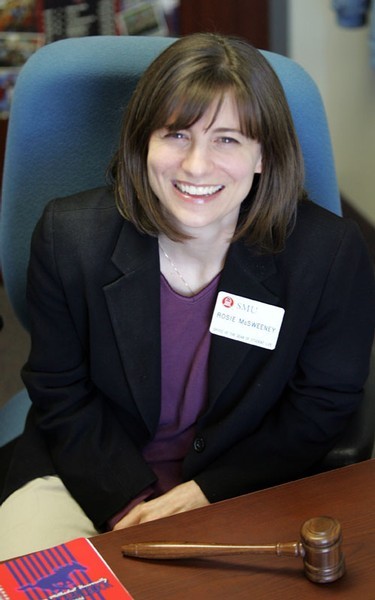
Rosie McSweeney (Photo by John Schreiber, The Daily Campus)
There are many words students and colleagues could use to describe Judicial Hearing Officer Rosie McSweeney.
Unfair isn’t one of them.
“Rosie is a very fair person,” said Shaku Patel, secretary for the Dean of Student Life Department in Hughes- Trigg. “She is nice person and a good person to work with.”
McSweeney, 33, meets with students who violate SMU’s Student Code of Conduct in order to help them make better decisions. She helps them deal with conflict and with their emotions toward other students. She also hears violation cases throughout the school year.
McSweeney said she always tries to be objective when making decisions.
“When an incident occurs, I hear about it from police reports or other students who inform me,” she said. “I then investigate the situation and educate the parties involved.”
The most frequent offense that McSweeney handles is alcohol possession and consumption. Even if there is a campus fight, it usually also ends up involving an alcohol violation, she said.
When a student gets in trouble for an alcohol or other violation, the university does not use words like “guilty” or “court” because this is not a formal legal system here, McSweeny said. Instead, students undergo what is called an administrative hearing, where all sides are heard.
SMU’s Student Code of Conduct outlines all of the rules and regulations at the university, including how violations will be handled. The code is outlined in the handbook each student receives at the start of every school year.
Most SMU students say they understand a code of conduct is needed to keep peace and order on campus.
“It just might make you feel like you’re in high school,” sophomore Anthony Mungioli said. “Obviously I have never been in trouble, but at the same time I see it necessary to have on campus.”
Students violate the code year-round and the violations come in waves, McSweeney said. Many violations occur at the start of a semester because students don’t feel as much academic pressure yet. Around midterms and finals, students are busier and the problems decrease. But violations spike again right before spring and fall breaks, she said.
McSweeney sees students from all years but says it typically takes freshman some time to develop time management and coping skills.
“First-year students have the hardest time managing their free time,” McSweeney said. “They go out and drink and don’t know their limits.”
McSweeney was born in Rochester, Minn., and graduated from Concordia University. She then received her masters in social work at Arizona State. Most of McSweeney’s family lives in Scottsdale, Ariz.
An avid hiker, McSweeney started working for SMU in August 2004. Before that she was an academic advisor at the University of Texas at Dallas. She has only been living in Texas a little more than two years.
“I like Texas but it’s hard to go hiking here,” she said with a smile. “And I love SMU. It’s a great opportunity for students.”
McSweeney also spends some of her free time working with younger students: She teaches high school students English every other weekend for the Upward Bound program at Cedar Valley College. The program helps minority students prepare for college, as well as the state-mandated TAKS test.
McSweeney said she has felt a connection with SMU students since she got here. Even among students who have conduct violations, she hasn’t encountered one who doesn’t want to be at SMU.
“I try to be fair,” she said. “I think most people see me that way.”








